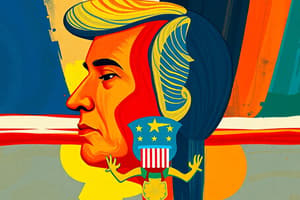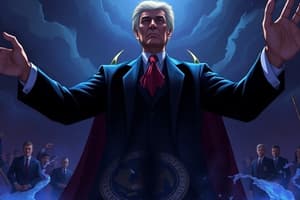Podcast
Questions and Answers
Which of the following powers are specific powers granted by the Constitution to Congress?
Which of the following powers are specific powers granted by the Constitution to Congress?
- Delegated powers
- Implied powers
- Expressed powers (correct)
- Inherent powers
Which of the following describes presidential powers necessary to allow the exercise of expressed powers?
Which of the following describes presidential powers necessary to allow the exercise of expressed powers?
- Implied powers (correct)
- Delegated powers
- Executive power
- Expressed powers
What are constitutional powers assigned to one governmental agency but exercised by another with permission?
What are constitutional powers assigned to one governmental agency but exercised by another with permission?
- Expressed powers
- Implied powers
- Executive orders
- Delegated powers (correct)
What is an agreement made between the president and another country?
What is an agreement made between the president and another country?
What is the communication with the president and close advisers that shouldn't be revealed without consent called?
What is the communication with the president and close advisers that shouldn't be revealed without consent called?
What is the President's role as commander in chief?
What is the President's role as commander in chief?
What powers allow the president to grant pardons and appoint federal judiciary members?
What powers allow the president to grant pardons and appoint federal judiciary members?
What is the president's inherent power to bring a legislative agenda before Congress called?
What is the president's inherent power to bring a legislative agenda before Congress called?
What are the president's powers as head of state that include receiving ambassadors?
What are the president's powers as head of state that include receiving ambassadors?
What powers allow the president to address Congress and veto bills?
What powers allow the president to address Congress and veto bills?
What are presidential powers implied but not directly stated by the Constitution?
What are presidential powers implied but not directly stated by the Constitution?
What is a rule or regulation issued by the president that has the status of legislation?
What is a rule or regulation issued by the president that has the status of legislation?
What is the informal group of major executive branch department heads called?
What is the informal group of major executive branch department heads called?
What limits the president's ability to commit troops without congressional authorization?
What limits the president's ability to commit troops without congressional authorization?
Who provides insights and analysis to inform the president about policies and political implications?
Who provides insights and analysis to inform the president about policies and political implications?
What are the permanent agencies that perform specific management tasks for the president called?
What are the permanent agencies that perform specific management tasks for the president called?
What body must approve every expenditure proposal from an executive agency?
What body must approve every expenditure proposal from an executive agency?
What advisory council includes the president, vice president, and the secretaries of state and defense?
What advisory council includes the president, vice president, and the secretaries of state and defense?
What is the informal advisory group the president turns to for guidance called?
What is the informal advisory group the president turns to for guidance called?
During whose administration was the Executive Office of the President created?
During whose administration was the Executive Office of the President created?
Presidents have always recorded signing statements as part of the official legislative record.
Presidents have always recorded signing statements as part of the official legislative record.
Why is the president’s State of the Union address important?
Why is the president’s State of the Union address important?
The power to declare war is an expressed power of the president.
The power to declare war is an expressed power of the president.
What significant event occurred when President Harry Truman seized control of the steel industry?
What significant event occurred when President Harry Truman seized control of the steel industry?
The National Security Council includes the Speaker of The House.
The National Security Council includes the Speaker of The House.
Flashcards are hidden until you start studying
Study Notes
Powers of the Presidency
- Expressed powers are those specifically granted to Congress by the Constitution.
- Implied powers allow the president to perform actions necessary to exercise expressed powers.
- Delegated powers are assigned by the Constitution to one governmental agency but exercised by another with permission.
- Inherent powers are not explicitly stated in the Constitution but are accepted as necessary for the presidency.
Agreements and Privileges
- An executive agreement is made between the president and a foreign nation, not requiring Senate approval.
- Executive privilege protects communication between the president and close advisers from being disclosed without consent.
Military and Judicial Powers
- The president serves as commander-in-chief, holding military powers to declare war and deploy troops.
- Judicial powers include granting pardons and appointing federal judges.
Legislative Functions
- Legislative initiative enables the president to propose a legislative agenda to Congress.
- The president has several legislative powers, including addressing Congress, vetoing bills, and issuing executive orders.
Diplomatic Leader
- The president functions as the head of state, receives ambassadors, and recognizes foreign governments.
Executive Structure
- The Cabinet consists of heads of major executive departments, though the president often relies on a Kitchen Cabinet, an informal group of advisers.
- The Executive Office of the President (EOP) includes permanent agencies to assist with management tasks.
Key Offices and Councils
- The Office of Management and Budget (OMB) reviews proposals from executive agencies that require funding.
- The National Security Council (NSC) advises the president on foreign policy, featuring top officials including the vice president and secretaries of state and defense.
State of the Union
- The State of the Union address allows the president to set the legislative agenda and draw public attention to policy priorities.
Historical Context and Precedents
- The Executive Office of the President was established during Franklin Roosevelt's presidency.
- President Andrew Johnson faced criticism for publicly campaigning for his policies after the Civil War, seen as undignified.
- Harry Truman's wartime actions during the Korean War exemplified unilateral presidential decisions leading to changes in military policy.
War Powers and Legislative Balance
- The War Powers Resolution aims to restrict presidential military actions without Congressional approval.
- Legislative powers have shifted over time, with Congress seeing a decline in authority regarding national defense and budgeting, as noted by expert Louis Fisher.
Additional Insights
- Signing statements can reflect a president’s interpretation of laws upon their enactment.
- Not all actions taken by the president, such as declaring war, qualify as expressed powers under the Constitution.
- The distinction between executive agreements and formal treaties is that executive agreements do not require Senate ratification.
Studying That Suits You
Use AI to generate personalized quizzes and flashcards to suit your learning preferences.




